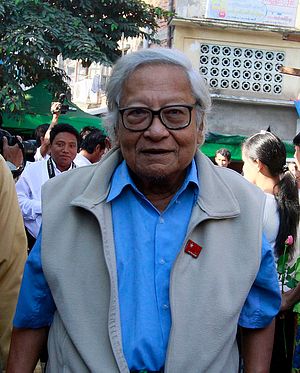In the week after journalist, poet and activist Win Tin was arrested by Myanmar’s military junta in 1989, some of his upper teeth were knocked out by interrogators. Doctors removed the rest and he was forced to eat hard rice without dentures for the next eight years. The former newspaperman, who died one year ago this week, also suffered untreated hernias and numerous beatings during his 19 years behind bars. Sometimes, the authorities agreed to take him to hospital in Yangon because the wounds were so bad.
Not that he wanted anyone to know about it.
“He asked me to promise not to tell the young generation,” recalled Aye Thar Aung, another former political prisoner, who met Win Tin in hospital during one of those admissions. “He was worried they would be scared and not do the politics,” he added. The way Win Tin explained it to his niece, as the journalist Rosalind Russell reported in Burma Spring, was that the truth could come out with his death. “Bones will crow.”
On Tuesday, the first anniversary of his death from multiple organ failure in his mid-80s – eight years after he was finally released from prison in 2008 – hundreds of his supporters jammed into a broiling Yangon restaurant to pay tribute. They dabbed the sweat from their faces with tissue paper and stood on chairs to get pictures as Aung San Suu Kyi, leader of opposition party the National League for Democracy (NLD), took her seat. In her speech, she said that although Win Tin was her senior, he never patronized her or acted like a “master.”
Her mentor was, however, unafraid to offer her an opposing view. Now, as the party moves closer towards pivotal elections planned for November, it’s one of the traits that is most missed. “If Aung San Suu Kyi is Burma’s Nelson Mandela, then U Win Tin was Burma’s Desmond Tutu,” said Mark Farmaner, director of Burma Campaign UK, in an email. Win Tin, a founding member of the NLD, was both a close ally of Aung San Suu Kyi and a fierce critic of some of the stances she took, especially on cooperation with the military, who still control a quarter of seats in parliament.
Soe Htun, a senior member of the former political prisoner group 88 Generation Students, recalled an NLD meeting where a vote was taken on whether to push for the amendment of Myanmar’s constitution, which bars Aung San Suu Kyi from assuming the presidency. Everyone raised their hand in favour of the amendments – except Win Tin. “He said, if you want to draw a new constitution, please put your hands up,” recalled Soe Htun.
Since Win Tin’s death, the NLD has been perceived to have distanced itself from several high-profile members who dissented from the party line. Executive committee member Thein Lwin, a vocal supporter of students who have been pushing for education reform, was removed from the leadership earlier this year. Information officer Htin Lin Oo was sacked after he criticised Buddhist extremists in a speech and was denounced by religious groups. “[Win Tin] was willing and able to speak his mind and be critical, even of Aung San Suu Kyi,” said Farmaner. “The role he played in the NLD, a public conscience, is sorely missed.”
But the year since Win Tin died has nonetheless been an active one for the grassroots of the party. Students have turned out in droves to campaign for the reform of the education system. “[Win Tin] would have been pleased to see so many young people protesting and becoming engaged in politics, not being intimidated by the mass arrests and jailings,” said Farmaner.
The crowd on Tuesday contained plenty of young faces, as well as Win Tin’s old friends, many of whom had personal as well as political stories to share. A Hla Tun, a Shia Muslim businessman, beamed as he recalled long talks with the activist over home-cooked Persian food. “He was the sort of person who didn’t care whether you were rich or poor,” said A Hla Tun. “He passed away very early.”
But his memory shows no sign of fading. At the back of the room, his blue shirt and longyi, the prison uniform he had refused to take off until the last political prisoner in Myanmar was freed, lay on a table. Crowds gathered to take photos, many dressed in their own blue shirts as a mark of respect.
There are still more than 150 political prisoners in Myanmar. The court cases continue. Dozens more – student activists rounded up during crackdowns on education protests earlier this year – are facing trial for their resistance.
































